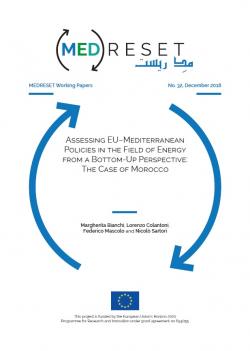Assessing EU–Mediterranean Policies in the Field of Energy from a Bottom-up Perspective: The Case of Morocco
The purpose of this report is to evaluate the effectiveness of EU policies and measures in the energy field in light of the needs and interests of local bottom-up actors in Morocco. The report firstly provides an overview of the Moroccan energy sector. It reviews the most relevant literature to define current and future trends, to identify the major challenges, analyse current national energy policies and assess their social impacts; then it describes the framework of EU energy policies in Morocco. In the second part, the report discusses the needs and interests of local bottom-up actors in the energy field mainly drawing on the recursive multi-stakeholder consultations held by the researchers in the field. In line with MEDRESET research questions, it highlights the most relevant issues brought up by the local respondents and a few EU stakeholders, evaluating their perception of current Moroccan and EU energy policies in the country and reporting their suggestions for improvements.
-
Details
Rome, IAI, December 2018, 33 p. -
In:
-
Issue
Working Paper 32
Introduction
1. Overview of the Moroccan Energy Sector
1.1 Current Energy Mix
1.2 Future Energy Trends
1.3 Key Challenges
1.4 Moroccan National Energy Policies
1.4.1 Renewables Promotion
1.4.2 Demand Management
1.4.3 Regulatory
1.4.4 Gas
2. Social Impacts Related to Energy
2.1 Subsidies
2.2 Coal Exploitation
2.3 Gender Perspective
2.4 Participation of Society in the Energy Transition
2.5 Employment
3. EU Energy Policies in Morocco
4. Recursive Multi-Stakeholder Consultations – Analysis. A Bottom-up Perspective on the Energy Sector in Morocco
4.1 Methodology
4.2 Core Issues at Stake
4.2.1 The Impact of Moroccan Energy Dependence
4.2.2 The Role of Natural Gas
4.2.3 The Reform of Governance
4.2.4 The Discrepancy Between Vision and Implementation in National Energy Policies
4.2.5 Conflict Over Resources, Energy Poverty and Other Distributional Issues
4.2.6 Gender Issues
4.3 How Local Stakeholders Assess EU Policies in Morocco
Conclusion and Policy Recommendations
References
Annex 1: List of Interviewees
Annex 2: Questionnaire



